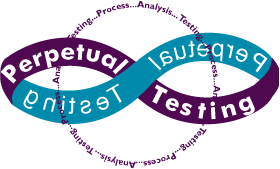
University of Oregon
Computer & Information Science

![]()

![]()
Perpetual Testing is a project teaming the University of Oregon with the University
of Massachussets, Amherst and the University of California, Irvine. It is
sponsored by the Defense Advanced Research
Projects Agency and Air Force Rome Laboratories,
and is part of the High Assurance and Real-Time cluster of projects within
the Evolutionary
Design of Complex Software (EDCS) program. In September 1997, the Perpetual
Testing project moved from Purdue University to the University of Oregon.
The perpetual testing project is building a foundation for analysis and
testing as on-going activities to improve quality without pause through
several generations of product. We believe "perpetual" testing
can supplant the current paradigm, which treats testing as a phase that
follows development and precedes deployment, with continuous analysis and
testing in the deployed environment as well as the development environment.
![]()
See:
![]() Perpetual Testing Research Projects at the University
of Oregon
Perpetual Testing Research Projects at the University
of Oregon
(Previously at Purdue University)
Our Team: Summer 1997
![]() Our Collaborators
Our Collaborators
Perpetual Testing Research at University of California, Irvine
Perpetual Testing Research at University of Massachussets, Amherst
![]() Our sponsors
Our sponsors
![]()
The Perpetual Testing Effort at Purdue is sponsored by the Defense Advanced
Research Projects Agency and Rome Laboratory, Air Force Materiel Command,
USAF, under agreement number F30602-97-2-0034. Additional support for some
of the research described here was provided by the National Science Foundation,
grant 9217432, and by Siemens Corporate Research. The U.S. Government is
authorized to reproduce and distribute reprints for Governmental purposes
notwithstanding any copyright annotation thereon. The views and conclusions
contained herein are those of the authors and should not be interpreted
as necessarily representing the official policies or endorsements, either
expressed or implied, of the Defense Advanced Research Projects Agency,
Rome Laboratory, or the U.S. Government.
![]()
Contact: Michal
Young